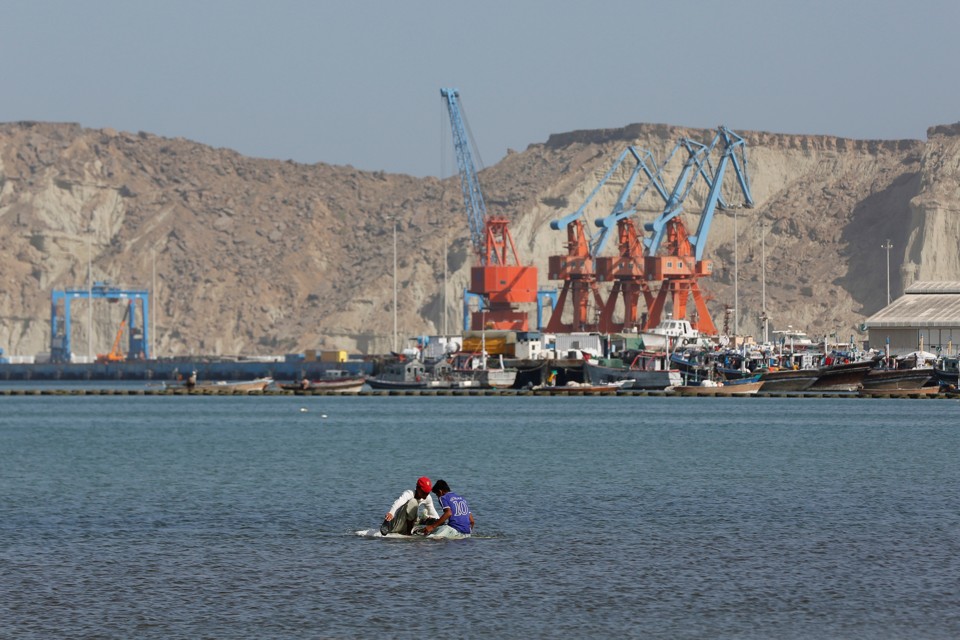 |
| Boys sit on a piece of styrofoam sheet as they search for crabs in front of the Gwadar port in Pakistan |
China Is Quietly Reshaping the World
The staggering scope of the country’s infrastructure initiative—and what it means for the international order
The Atlantic | 17 October 2017
China is quickly growing into the world’s most extensive commercial empire. By way of comparison, after World War II, the Marshall Plan provided the equivalent of $800 billion in reconstruction funds to Europe (if calculated as a percentage of today’s GDP). In the decades after the war the United States was also the world’s largest trading nation, and its largest bilateral lender to others.
Unlike the United States and Europe, China uses aid, trade, and foreign direct investment strategically to build goodwill, expand its political sway, and secure the natural resources it needs to grow. Belt and Road is the most impressive example of this. It is an umbrella initiative of current and future infrastructure projects. In the next decades, China plans to build a thick web of infrastructure around Asia and, through similar initiatives, around the world.
Most of its funding will come in the form of loans, not grants, and Chinese state-owned enterprises will also be encouraged to invest. This means, for example, that if Pakistan can’t pay back its loans, China could own many of its coal mines, oil pipelines, and power plants, and thus have enormous leverage over the Pakistani government. In the meantime, China has the rights to operate the Gwadar port for 40 years.
The initiative also has a positive side effect for Beijing: Some Chinese government officials say specifically that it’s about competing with the United States. At a minimum, it creates leverage to make many smaller countries feel economically beholden to China.
So what does all this mean for the “liberal international order” that the U.S. did so much to create and uphold over the past seven decades? The effect is not all bad.
If the point of that order was to secure peace and prosperity, there are ways in which China’s largesse actually complements it. Countries that trade more generally fight less, not just with their trading partners, but with the world in general. In its own way, China is thus helping to uphold international peace. Yet even if there is less interstate war under a “Pax Sinica,” an era when many small “donee” states are beholden to China means that on a slew of other issues—from counterterrorism to sanctioning countries at odds with the West—the U.S. will find it harder to impose its will.
Also, while Chinese loans used to have low interest rates around 2.5 percent, they are now creeping up to near 5 percent or more. This will make them harder to repay. While those who receive Chinese funds are happy to fix their power shortages and improve their roads, they may be mortgaging their futures.
Perhaps the biggest challenge China’s efforts pose to the “liberal international order” is that, in contrast to most Western aid and loans, Belt and Road projects often encourage terrible governance, environmental, and human rights standards, although China’s record on this has improved somewhat over the past few years.
China is often the largest investor
in countries that others ostracize—because they are run by dictators,
don’t respect human rights, and are corrupt—such as Zimbabwe, North
Korea, Niger, Angola, and Burma. Ugandan President Yoweri Museveni—no
guardian of human rights—explained that he likes Chinese investment
because they “don’t ask too many questions,” and “come with … big
money, not small money.” Of course, while the U.S. and Europe insist on
high standards for their aid projects today, both their companies and
governments also had terrible records on human rights and the
environment when they ventured to India, Africa, Latin America in the
19th and early 20th centuries.
On worker safety and the environment, when China first ventured abroad, its standards were often abysmal. In some areas, Chinese firms
still leave behind a mess of underpaid miners, devastated forests, and
ruined rivers. Yet China is learning quickly. In 2017, the Chinese
government published new, more stringent guidelines
for outbound investors. China’s new infrastructure investment bank, the
AIIB, wants to apply world-class standards, and many Chinese
companies—including the national oil behemoth CNOOC—are improving
rapidly.
If China’s geoeconomic push continues, it will be its
largest legacy and have a profound impact on the world—not necessarily
all negative. Since the West doesn’t have $1 trillion to lavish on
developing country infrastructure in a new great game, its best choice
may be to coopt and shape this juggernaut. If the Belt and Road
initiative is a success, asphalt will be smoother, logistics will run
faster, and countries that were cut off from world markets will be able
to trade more. If the research cited above holds true, that will lead to
fewer interstate wars, although it will make many small countries
beholden to China. President Xi emphasized in both his 2015 and 2017
visits to the United States, and at Davos, that China wants a more
equitable international system, but it does not want to unravel the
international order. By encouraging China to raise the labor, human
rights and environmental standards of their projects, the world should
hold him to it.


China Is Quietly Reshaping the World
ReplyDelete--------------------
Actually, they are quite loud. And already we see both Cambodia and Philippines selling out to China and betraying USA.
Khmers can still blame Vietnamese for all the problems but the Philippines can't.